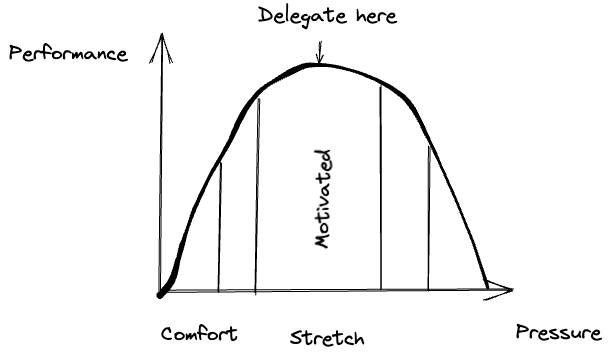The Art of Delegation

Some time ago when I joined a team, one of my direct reports was an engineering lead there with a team of engineers and QAs reporting to them. This person was the most senior team member with ample domain knowledge. But they suffered from work overload and were a bottleneck. They received tens of requests a day from multiple stakeholders and sometimes worked late hours to process them. They accumulated tech debt, suffering from deadlines and promises. Eventually, they almost burned out. Also, they had a team who was pretty junior and unmotivated at the time. When I joined I saw they didn't use the power of delegation well enough to be a more successful manager.
Why delegate?
The obvious and less obvious reasons are:
- Time. Delegation saves time. One person can do much less than a group of people. Especially, it's reasonable for urgent tasks.
- Competence. One person (you) cannot have a high level of competence in every topic. If you think you can, this is your Ego speaking. So delegating a task to a person who is more competent in this area will increase the chance of a high-quality outcome. That's why it's important to reflect on your and your team members' strong and weak sides. This would let you leverage your team members' strong sides to achieve the best results.
- Trust. Delegation is an act of trust. When you delegate you build and enhance trust between you and your team. It means you demonstrate that you believe that a person is skilled for the job and reliable to complete it within the time and the quality you need. You are also comfortable sharing all the required information. And for your team, delegation is the way to earn trust.
- Learning and growth. Delegation might be a way for the team to learn and grow professionally. If a task stretches them a bit, it becomes a learning opportunity. It also spreads the knowledge in the team reducing the "bus factor". In fact, the more mature team - the more problems they can successfully solve.
- Motivation. Motivation naturally improves in an environment of trust and growth. As a result, it positively impacts the overall performance.
The lead I mentioned above underutilized the power of delegation. As a result, he didn't nurture trust in the team and didn't let them grow and handle the requests independently.
When to delegate?
It is good to delegate when there is an opportunity to impact one of the parameters above.
- delivery speed,
- quality of the outcome,
- improve trust,
- grow team members' skills
- improve team motivation and ultimately performance
Before delegating a task, a manager should keep in mind the following correlation between pressure and performance. The delegation would trigger the best performance when a task is a little stretch for the assignee. The person would be naturally more interested to complete it and they would still have a high chance of successful completion.

It's less efficient if the task lands in a comfort zone. The person would complete it but with less intrinsic motivation. If the task lands in a pressure zone, the chances of high performance are low due to a mismatch between the assignee competencies or time constraints and the task.
Apart from the projected performance vs pressure, it's good to consider the following questions:
- Do you have time to let them learn, fail and retry or this must be done quickly and with high quality? If the latter, your delegation opportunity becomes much less. If there is no experienced team member for the task, do it yourself.
- Can you make time to clarify the requirements and set a time frame? You should spend time clearly articulating the goals during the delegation assignment. In some cases, explaining what and when it needs to be done takes more time than the actual task. In this case, it's worth considering doing it yourself.
- How important is the task? If it's not, you should find a way to delegate. So you can free your personal time for higher-value tasks. If it's a no-value task, you should eliminate it entirely.
So a manager should delegate if the above considerations suggest it's a good opportunity.
How to delegate?
Typically you delegate through a conversation with an assignee. This conversation should be planned. Communication is key to the success of delegation.
The following questions are typically covered during the delegation conversation with an assignee.
- What is the task?
- When does it need to be completed?
- Why this is a good opportunity for them?
- What is the definition of done?
- What are the milestones and when are you checking in?
The answers to the above questions should give all the necessary context to the assignee. The conversation requires input from both sides.
Once I struggled with the last point which caused misalignment. I delegated an urgent task and didn't agree on the milestones/ checking points. I assumed as it was urgent the person would come back to me with updates soon. But they didn't and I had to ask about the progress once or twice. Then the person assumed I didn't trust them and was trying to micro-manage them checking about the progress often. So it would have been good if we had aligned on the progress updates up front.
What not delegate
There are things that a manager should never delegate. They typically represent the core part of their role and do not make sense when delegating. It includes:
- one-on-ones
- people development, feedback, coaching
- strategic planning of the technology roadmap
- optimising team topology
- hiring strategy
- performance reviews etc.
This list may vary depending on the scope of a specific manager role.
Summary
In summary, delegation is important because it leads to efficient use of time, improved productivity, development of team skills, effective time management, and improved trust and performance. Effective delegation can help managers to achieve project goals, meet deadlines, and build strong, effective teams.
The manager I mentioned above started delegating and empowering their team more. It had a positive effect: offload of the work from them and giving an opportunity to develop the team skills and improve their motivation.